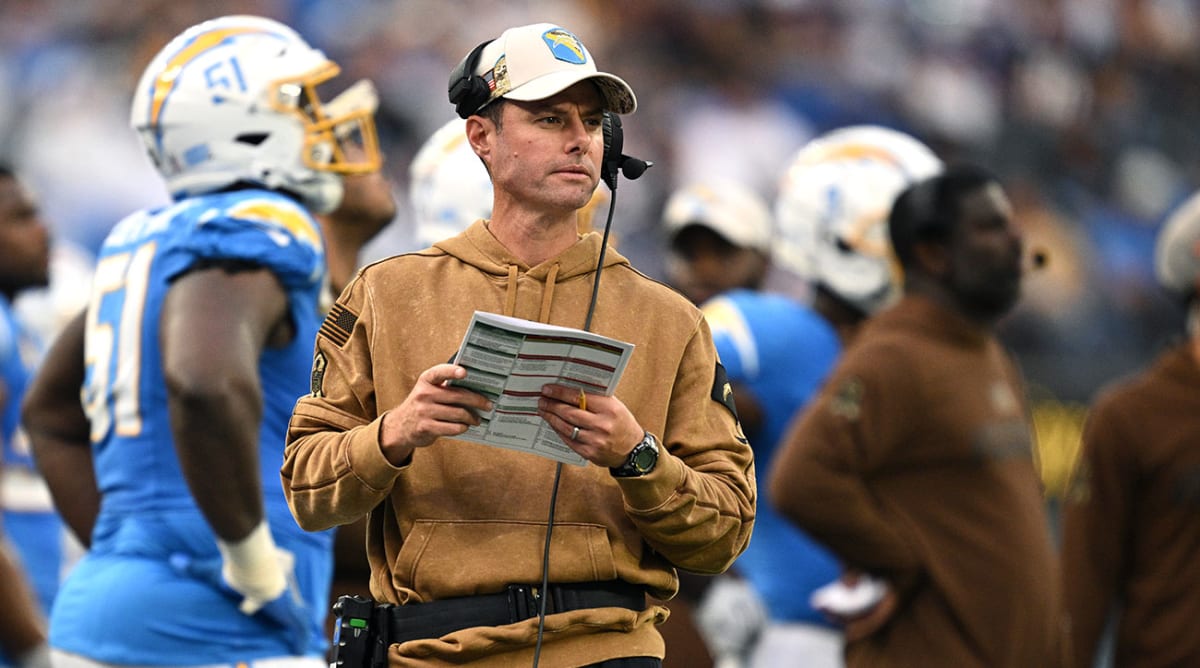At yet another contentious press conference, this time after a narrow loss to the Packers, Brandon Staley looked like a man nearing his end as a head coach (for now). When someone reaches the clip-the-angry-part-of-the-presser phase of their coaching tenure, and those moments become more frequent, we often lose touch with the breadth of the narrative and count down the days until termination. This could, generously, be described as Volume III of Staley’s greatest hits. Social media will take it from there.
But it’s worth considering the potential roots of the frustration, at least from where I am sitting. Staley continues to take the blame for the fate of the Chargers, beginning, in earnest, with the team’s collapse against the Jaguars in the playoffs. The Chargers have lost six games this season, most of which they were in a position to win. L.A. dropped its opener against the Dolphins by two points … then its second game against the Titans by three points, its fifth game against the Cowboys by three points, its ninth game against the Lions by three points and its 10th game against the Packers by, you guessed it, three points.

Orlando Ramirez/USA TODAY Sports
On Sunday, the machinations leading up to the loss were particularly heartbreaking. The Chargers’ first-round pick, Quentin Johnston, dropped a potential game-winning touchdown. Before that, Austin Ekeler surrendered a fumble inside the 5-yard line. Asante Samuel Jr. was flagged for a defensive pass interference on a third-and-20, which opened the sieve for another corner, Michael Davis, to miss the first of a handful of tackles on a Dontayvion Wicks catch that set up Green Bay’s eventual game-winning touchdown.
It sets up what has been a familiar choice for Chargers fans. They are left to wonder whether their team is just bad at picking coaches, or there is some broader reason as to why Staley is now the second coach in as many tries who has lost a disproportionate amount of his games by one score. Anthony Lynn, now an assistant head coach in a critical role on Kyle Shanahan’s 49ers staff, seemed to run a team that embodied Los Angeles’s inability to finish games. Then it kept happening.
To me, the Chargers’ setup, from a narrative perspective, offers a difficult situation for a prospective head coach: Succeed because the quarterback who fell into your lap in the 2020 draft is great, or get buried without the benefit of the doubt. Through that process, Justin Herbert, who is excellent but not infallible, is a kind of counterweight. Offensive success is discounted. A lack of defensive success is magnified, even though the defense needs a lot of help from a personnel standpoint.
The reality is that the Chargers have been mediocre for a long time, long before Staley’s arrival. Since 2013, the Chargers are 83–89. Tom Telesco has been the general manager throughout that time and, despite a handful of solid draft picks such as Joey Bosa, Derwin James and Rashawn Slater, the team always seems to be grasping desperately for help bandaging some of its biggest vulnerabilities. For example, when Staley arrived in 2021, the team was woefully unprepared to handle the run. Last year, the Chargers finished dead last in yards per rushing attempt allowed. This year, they are 16th. Now, they are struggling in the secondary due in large part to the economic swing and miss of J.C. Jackson from free agency in ’22. This in a division where they have to compete with Patrick Mahomes and Andy Reid; and with a schedule this season that included the pairings of Tua Tagovailoa and Mike McDaniel, Jared Goff and Ben Johnson, and Dak Prescott and Mike McCarthy. Telesco reportedly apologized to the team for signing Jackson. At corner, the team is playing the likes of Davis (a Charger since 2017), Ja’Sir Taylor (a 2022 sixth-round draft pick) and Samuel (a second-round pick in ’21).
By zooming out just a little bit, it’s interesting to ask ourselves: Are these coaches just not practicing late-game situations? Do they not practice tackling? Do they call bad games? Or, as Staley said at the press conference in one of the moments not clipped on social media, are they in most of the games in which they play, which, while left unsaid, would seem to indicate that some level of good coaching has brought them to this point?
I don’t know the answer, but I wonder whether those who are pulling the strings in L.A. do either. How do we grade a top-heavy roster without much of a supporting middle class? How do we incorporate that grade into punishing a coach who has suffered only six of his 21 losses by more than a touchdown, and is seemingly left on an island to talk about it ad nauseam? That might be frustrating.
Sure, the Chargers can fire Brandon Staley, which is the inevitable follow-up thought for most of us here. But what will happen next if nothing else changes? That we may already know the answer to.







